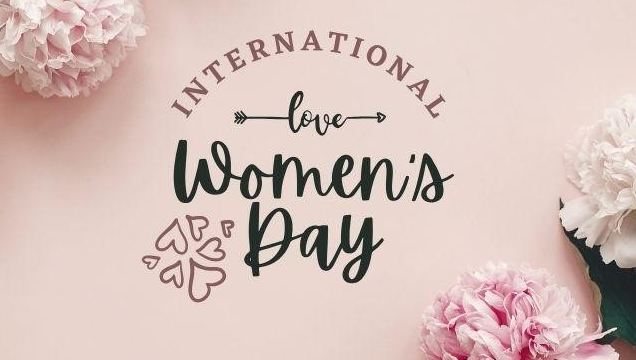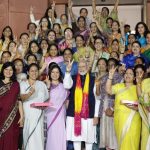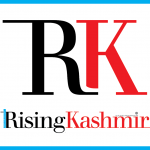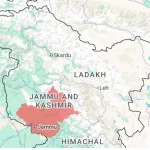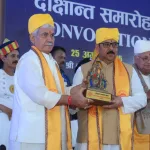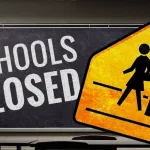INTERNATIONAL WOMEN’S DAY
March 08 happens to be a special day every year ever since United Nations recognized this day in 1975. This year it is extra special because it marks the 30th anniversary of the Beijing Declaration and Platform for Action-the most progressive and widely endorsed blueprint for women’s and girls’ rights worldwide. Although women day is celebrated on March 08, yet the reality is that no day is complete without women. From kitchen to raising children; working in the fields and rearing of livestock, women play a multifaceted role in our lives. It is difficult to imagine a world without women. The fairer sex has been the indispensible part of our societies since the existence of life. All across the globe they have been contributing to every sector of economy. Besides having a pivotal and binding role in families and farming they have been paying a proactive and instrumental role in health, education, manufacturing, service and many other vital sectors of the economy.
Unfortunately in all these developments, they remain largely invisible and unrecognized. The male dominated society has not yet allowed them to come out of four walls of their homes. They still aspire for a proper place in the social hierarchy. Decision making still eludes them and they are the worst victims of various social stigmas, prejudices, stereotypes, domestic violence and various other gender related issues. Gender inequality still persists in our societies. Worldwide, women have less access than men to resources such as land, credit, agricultural inputs, decision-making, technology, training and extension services that would enhance their capacity to adapt to climate change.
The gender inequality mainly results from uneven access to education, lack of employment equality, Job segregation, inadequate legal protections, poor access to health care, lack of religious freedom, inadequate political representation and many other related causes. Due to the prevailing gendered differences in terms of inequality and inaccessibility, their risk of gender-based violence escalates; for example, girls are sometimes forced into child marriage when families rely on this practice as a survival strategy during droughts. Across the world, women remain concentrated in the lowest paid jobs, many in extremely vulnerable forms of employment. Women are still underrepresented in public life and decision-making and gender equality is still a distant dream despite many tall claims being made for the same. Regarding gender gap, according to the World Economic Forum (WEF), it won’t close until 2186.
Recently, the World Economic Forum released the 18th edition of its annual Global Gender Gap Report for 2024, comprehensively benchmarking gender parity across 146 economies worldwide. It benchmarks progress towards four key dimensions viz economic participation and opportunity, educational attainment, health and survival and political empowerment. According to the report, the global gender gap score in 2024 is 68.5%, meaning 31.5% of the gap remains unaddressed. Progress has been extremely slow, with only a 0.1% point improvement from 2023. At the current rate, it will take another 134 years to reach full gender parity globally far beyond the 2030 SDG target. The gender gaps remain largest in Political Empowerment (77.5% unaddressed) and Economic Participation & Opportunity (39.5% unaddressed).
To highlight various issues being faced by the women, recognize the contribution of women and to further strengthen their roles in the development process, March 08, every year is celebrated as the ‘International Women Day (IWD) all across the globe. On IWD, women across the world come together to force the world to recognize these inequalities while also celebrating the achievements of women who have overcome these barriers. The ‘International Women Day’ originated back in 1908 when some 15,000 women marched through New York City demanding voting rights, better pay and shorter working hours. The United Nations recognized this day in 1975 and since it has created a theme each year for the celebration of the day.
Theme of IWD 2024
A theme on which every year this important global days activities revolve is the hall mark of the important event. This year International Women Day is celebrated with the theme “For ALL women and girls: Rights, Equality and Empowerment”.
Women Entrepreneurship related programmes
This year’s theme of the day is very significant because empowerment is the key to achieving equality and securing rights for them. Government of India has also started many entrepreneurship development programmes for women. There are many skill development programmes tailored to women needs being offered by various government institutes and private agencies as well as various NGOs. As women are an important part of agriculture sector, various skill and entrepreneurship opportunities for farm women are being provided by the government. Taking advantage of these progammes, many young girls and women have successfully set up their own income generation and providing employment to many others too.
Some of the programmes related to farm women include:
- Namo Drone Didi Yojana: The Namo Drone Didi scheme, recently launched by the Government of India, aims to modernize Indian agriculture and empower women-led Self-Help Groups (SHGs). Under the Yojana, drones would be provided to 15,000 Self Help Groups (SHGs) for renting them to farmers for agricultural purposes. The women from SHGs would also be given fifteen days free of cost training on how to operate these drones. The member from women self help groups would rent out the drones to others and earn a decent livelihood.
- Krishi Sakhis: The programme aims to transform rural India through the empowerment of rural women as Krishi Sakhi, by imparting training and certification of Krishi Sakhis as Para-extension Workers. Krishi Sakhis are chosen as agriculture Para-extension workers because they are trusted community resource persons and experienced farmers themselves. Their deep roots in farming communities ensure they are welcomed and respected. Government will update their skills in different farming practices by providing them appropriate trainings in different aspects related to agriculture and allied sectors. After acquiring training, their potential can be used in dissemination and transfer of technologies and in promoting agri based entrepreneurship through Krishi Sakhis.
- Rashtriya Mahila Kosh (RMK): It extends micro-credit to poor and underprivileged women through a collateral-free, quasi-formal delivery mechanism where NGOs, women co-operatives, federations etc. act as intermediaries.
- DAY-National Rural Livelihood Mission (NRLM): The Deendayal Antyodaya Yojana-NRLM primarily focuses on formation of Self Help Groups (SHGs) with exclusive women membership for their mobilization and empowerment. A SHG usually consists of 10-20 women in plain areas and 5-20 in difficult areas. An important component of NRLM is the Mahila Kisan Sashaktikaran Pariyojana (MKSP) which aims to support women farmers’ and build their capacities in agro-ecological sustainable practices. Primarily, MKSP aims to recognize women farmers, a hitherto unrecognized category, even though most of the farming activities are almost exclusively handled by the women. MKSP also, inter alia, seeks to reduce drudgery for women farmers.
- Support to Training and Employment Programme (STEP): STEP aims to upgrade the traditional skills and knowledge of women through training besides employment, credit and market linkages in the traditional sectors of agriculture, animal husbandry, dairying, fisheries, handlooms, handicrafts, khadi and village industries, sericulture, social forestry and wasteland development for enhancing their productivity and income generation.
- Annapurna: This scheme started by the government in 2000 seeks to grant a loan of rupees 50,000 to women entrepreneurs engaged in food catering business.
- Mahila Coir Yojana: The Yojana aims to provide support to women engaged in the coir business by giving them training, equipment and credit support to women engaged in coir business.
- Startup India: It aims to facilitate loan to the amount between 10 lakhs and 1crores to at least one woman per bank branch for setting up a green-field enterprise in manufacturing, trading or services sector. The scheme primarily targets women and individuals from SC/ST.
- Mahila E-Haat: Mahila E-Haat is an initiative for meeting aspirations and needs of women entrepreneurs. It is an online marketing platform for women, where participants can display their products. It is an initiative for women across the country as a part of ‘Digital India’ and ‘Stand Up India’ initiatives.
- MUDRA: Under Micro-units Development Refinance Agency (MUDRA), any woman can start a new business or scale up an existing one can avail loan. Three categories of loan are being provided under MUDRA which includes Shishu (loan up to rupees 50,000), Kishore (loan up to 5 lakhs and Tarun (loan up to 10 lakh).
- Mahila Udyam Nidhi Yojana: Small Industrial Development Bank of India (SIDBI) offers this scheme Mahila Udyam Nidhi (MUN) to encourage and empower women entrepreneurs and promote women Entrepreneurship by providing financial assistance at concessional interest rates.
- Udyogini scheme: The Udyogini scheme aims to foster self-reliance and empower women through economic development, offering support for self-improvement. This initiative assists aspiring female entrepreneurs by providing loans with favorable interest rates, in contrast to the exorbitant rates in the private sector, establishing a reliable lending source. Eligibility is limited to those with a family income below Rs 40,000 annually, with a focus on encouraging loans in the trade and service sector, capped at Rs 1 Lakh.
Besides National Institute of Agricultural Extension Management (MANAGE), Hyderabad an autonomous institute under Ministry of Agriculture and Farmers Welfare, Government of India also conducts various skill trainings and entrepreneurial programmes for youths including young girls and farm women. The Krishi Vigyan Kendra’s are also actively involved in skill upgradation of young girls and women in various aspects of crop and animal husbandry.
(The author writes on agriculture and social issues; can be reached at [email protected])


